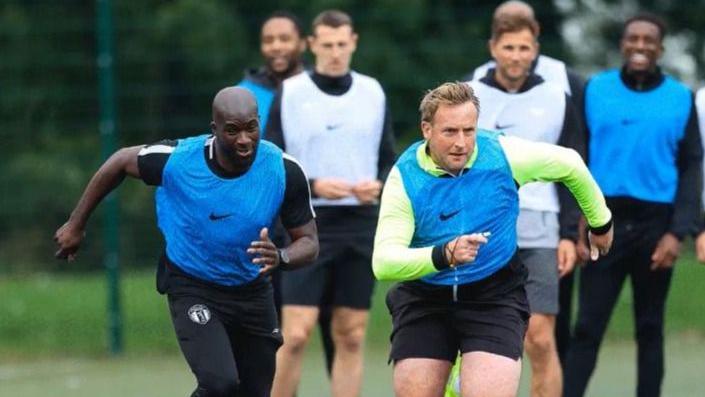'You'll need a thick skin' - ex-Vale captain begins referee journey

Anthony Griffith (left) is part of a three-year programme set up between players union, the PFA, elite refereeing body PGMOL and with funding from the Premier League
- Published
As a no-nonsense, tenacious-tackling midfielder, former Port Vale captain Anthony Griffith was no stranger to referees.
Booked 53 times and sent off once in his 228 appearances for Vale, Griffith had a bit of practice at pleading his case to the man in the middle.
Now, nearly a decade on from his final league game, Griffith is among 16 former professionals keen to experience the game from the other side - from the perspective of the official with the cards in their pocket and the weight of getting everything right on their shoulders.
The Professional Game Match Officials Limited (PGMOL) and the Professional Footballers' Association (PFA) announced the three-year refereeing scholarship "player to match official" programme in the summer, as part of the Elite Referee Development Plan.
It hopes to offer a pathway for former professionals into refereeing and potentially fast-track them into officiating at the higher echelons of the game.
"I think it will be intimidating and hostile," Griffith told BBC Radio Stoke. "You'll need a thick skin but I feel like I've got those attributes to go in there."
'We are the trailblazers' - the ex-players becoming refs
- Published11 September 2024
Football 'calling out' for ex-players to become referees
Griffith's journey towards becoming a referee, and a crack at the job often described as the 'hardest in football', started in September.
After a brief flirtation with refereeing 10 years ago, when the idea of getting players into officiating was first tried, Griffith said it was an experience that stuck with him.
"I had a go at it in 2014 and I really enjoyed it," he added. "Staying connected to the game and controlling the whole match - it was great.
"At the time there was no pathway, so I'm pleased that there's an opportunity for ex-players because the game is calling out for that niche."
While Griffith's love for a tackle may have put him in front of a referee a fair bit, he says the way he tried to speak to them is something he is using on the new course.
"I think the way you communicate with players is key," he said.
"Referees are human and will make mistakes but there is that communication aspect where you can talk to a player if you've got it wrong.
"I tried to communicate with the referee - it makes a little bit of a difference when you've got the armband because you can communicate a bit more and you're also in the pre-match talk so you get that feel."
Griffith knows that "shouting, screaming and balling" at referees "doesn't do you any favours" adding: "Yes, there may have been a lot of yellow cards [in my career] but there was never any disrespect towards the referee".

Anthony Griffith had two spells with Port Vale during his career, between 2008-12 and in 2013-14
Griffith's career spanned more than 500 games across a number of levels, and included spells with Doncaster Rovers, Darlington, Leyton Orient, Shrewsbury Town and Carlisle United.
After retiring, he moved into the coaching set-up at Vale before getting a taste of management at non-league Congleton Town.
The 37-year-old says the skills he acquired in that phase of his career will also come in handy on his route to becoming a referee.
"I'm not going to get it right 100% of the time, because no-one ever will," he said.
"There will be errors and I will show that human element when I'll apologise to players because I've maybe not got it right.
"There are players who don't watch football, don't have a feel for it or understand it but are gifted players.
"Then there are players who understand the game, have done the coaching badges, understand what the teams are doing and let the game flow.
"I think I've got that."
Anthony Griffith was talking to BBC Radio Stoke's Lee Blakeman.